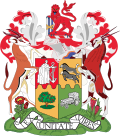| Monarchy of South Africa | |
|---|---|
 | |
 | |
| Details | |
| Style | His Majesty (1910–1952) Her Majesty (1952–1961) |
| First monarch | George V |
| Last monarch | Elizabeth II |
| Formation | 31 May 1910 |
| Abolition | 31 May 1961 |
From 1910 to 1961 the Union of South Africa was a self-governing country that shared a monarch with the United Kingdom and other Dominions of the British Empire. The monarch's constitutional roles were mostly delegated to the Governor-General of the Union of South Africa.
The South Africa Act 1909 united four British colonies: Cape of Good Hope, Natal, Orange River Colony and Transvaal, to form the Union of South Africa with the monarch as its head of state. In 1947, King George VI became the first reigning monarch to visit South Africa. His successor, Queen Elizabeth II was granted a distinct South African style and title by the Parliament of South Africa in 1953.
South Africa became a republic and left the Commonwealth on 31 May 1961. On 1 June 1994, South Africa rejoined the Commonwealth as a republic, after the end of apartheid.